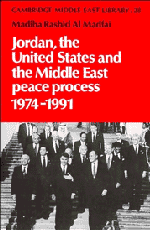Book contents
- Frontmatter
- Contents
- Foreword by William B. Quandt
- Acknowledgements
- Prologue
- 1 Introduction
- 2 Kissinger's legacy and imprint on the Middle East
- Part I Jordan in the Carter Middle East policy
- Part II Jordan in the Reagan Middle East policy
- 6 The evolution of Reagan's strategy
- 7 The US, Israel and Jordan: collaboration and discord
- 8 Two cases of collaboration and discord
- 9 The US and Jordan: how ‘much’ became ‘too much’
- Part III US, Jordan and Arab approaches to peace
- Appendices
- Notes
- Select bibliography
- Index
- Cambridge Middle East Library
7 - The US, Israel and Jordan: collaboration and discord
Published online by Cambridge University Press: 25 February 2010
- Frontmatter
- Contents
- Foreword by William B. Quandt
- Acknowledgements
- Prologue
- 1 Introduction
- 2 Kissinger's legacy and imprint on the Middle East
- Part I Jordan in the Carter Middle East policy
- Part II Jordan in the Reagan Middle East policy
- 6 The evolution of Reagan's strategy
- 7 The US, Israel and Jordan: collaboration and discord
- 8 Two cases of collaboration and discord
- 9 The US and Jordan: how ‘much’ became ‘too much’
- Part III US, Jordan and Arab approaches to peace
- Appendices
- Notes
- Select bibliography
- Index
- Cambridge Middle East Library
Summary
Assistance to Israel
Arms supplies are a major factor in US strategy toward the Middle East. ‘Security assistance and arms sales improve our forward defense and help our friends to defend themselves’. Secretary of Defense Weinberger explained in testimony before the House Foreign Affairs Committee on 9 February 1984. ‘These military assistance programs are the overseas counterparts of our defense efforts and represent no less an investment in US national security than the programs for the Department of Defense itself. It is an essential instrument of overall US defense strategy and foreign policy.’
The US commitment to assist Israel in economic and military terms is based upon what is perceived as its value as a strategic asset in the Middle East; and support for Israel is rooted in perceived common cultural, religious and political values. The fact that some Arab countries are also supplied with weaponry in an attempt to improve their capability to meet threats from Iran or elsewhere – but excluding Israel – and to deter what was seen then as Soviet expansionism, poses a problem for the US in that it could also increase the potential Arab threat against Israel. Israel is therefore always provided with more assistance than the Arabs not only to maintain the balance, but also in the hope that by thus providing it with a cushion of security, Israeli pre-emptive attacks on the Arab states can be prevented.
- Type
- Chapter
- Information
- Publisher: Cambridge University PressPrint publication year: 1993

